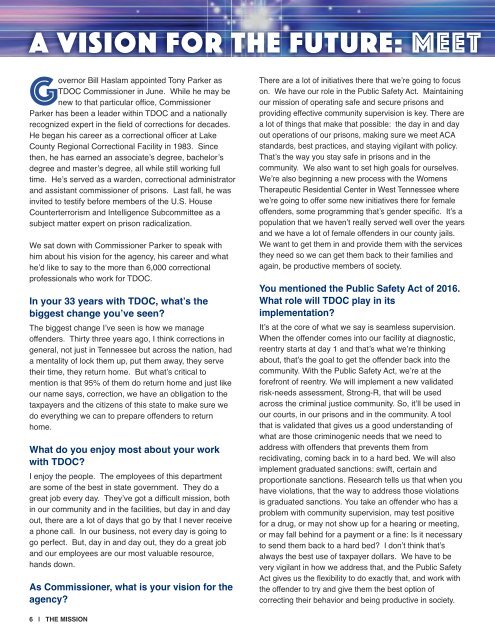THE MISSION
TheMissionMagazineWinter2016
TheMissionMagazineWinter2016
You also want an ePaper? Increase the reach of your titles
YUMPU automatically turns print PDFs into web optimized ePapers that Google loves.
A Vision for the Future: meet<br />
Governor Bill Haslam appointed Tony Parker as<br />
TDOC Commissioner in June. While he may be<br />
new to that particular office, Commissioner<br />
Parker has been a leader within TDOC and a nationally<br />
recognized expert in the field of corrections for decades.<br />
He began his career as a correctional officer at Lake<br />
County Regional Correctional Facility in 1983. Since<br />
then, he has earned an associate’s degree, bachelor’s<br />
degree and master’s degree, all while still working full<br />
time. He’s served as a warden, correctional administrator<br />
and assistant commissioner of prisons. Last fall, he was<br />
invited to testify before members of the U.S. House<br />
Counterterrorism and Intelligence Subcommittee as a<br />
subject matter expert on prison radicalization.<br />
We sat down with Commissioner Parker to speak with<br />
him about his vision for the agency, his career and what<br />
he’d like to say to the more than 6,000 correctional<br />
professionals who work for TDOC.<br />
In your 33 years with TDOC, what’s the<br />
biggest change you’ve seen?<br />
The biggest change I’ve seen is how we manage<br />
offenders. Thirty three years ago, I think corrections in<br />
general, not just in Tennessee but across the nation, had<br />
a mentality of lock them up, put them away, they serve<br />
their time, they return home. But what’s critical to<br />
mention is that 95% of them do return home and just like<br />
our name says, correction, we have an obligation to the<br />
taxpayers and the citizens of this state to make sure we<br />
do everything we can to prepare offenders to return<br />
home.<br />
What do you enjoy most about your work<br />
with TDOC?<br />
I enjoy the people. The employees of this department<br />
are some of the best in state government. They do a<br />
great job every day. They’ve got a difficult mission, both<br />
in our community and in the facilities, but day in and day<br />
out, there are a lot of days that go by that I never receive<br />
a phone call. In our business, not every day is going to<br />
go perfect. But, day in and day out, they do a great job<br />
and our employees are our most valuable resource,<br />
hands down.<br />
As Commissioner, what is your vision for the<br />
agency?<br />
There are a lot of initiatives there that we’re going to focus<br />
on. We have our role in the Public Safety Act. Maintaining<br />
our mission of operating safe and secure prisons and<br />
providing effective community supervision is key. There are<br />
a lot of things that make that possible: the day in and day<br />
out operations of our prisons, making sure we meet ACA<br />
standards, best practices, and staying vigilant with policy.<br />
That’s the way you stay safe in prisons and in the<br />
community. We also want to set high goals for ourselves.<br />
We’re also beginning a new process with the Womens<br />
Therapeutic Residential Center in West Tennessee where<br />
we’re going to offer some new initiatives there for female<br />
offenders, some programming that’s gender specific. It’s a<br />
population that we haven’t really served well over the years<br />
and we have a lot of female offenders in our county jails.<br />
We want to get them in and provide them with the services<br />
they need so we can get them back to their families and<br />
again, be productive members of society.<br />
You mentioned the Public Safety Act of 2016.<br />
What role will TDOC play in its<br />
implementation?<br />
It’s at the core of what we say is seamless supervision.<br />
When the offender comes into our facility at diagnostic,<br />
reentry starts at day 1 and that’s what we’re thinking<br />
about, that’s the goal to get the offender back into the<br />
community. With the Public Safety Act, we’re at the<br />
forefront of reentry. We will implement a new validated<br />
risk-needs assessment, Strong-R, that will be used<br />
across the criminal justice community. So, it’ll be used in<br />
our courts, in our prisons and in the community. A tool<br />
that is validated that gives us a good understanding of<br />
what are those criminogenic needs that we need to<br />
address with offenders that prevents them from<br />
recidivating, coming back in to a hard bed. We will also<br />
implement graduated sanctions: swift, certain and<br />
proportionate sanctions. Research tells us that when you<br />
have violations, that the way to address those violations<br />
is graduated sanctions. You take an offender who has a<br />
problem with community supervision, may test positive<br />
for a drug, or may not show up for a hearing or meeting,<br />
or may fall behind for a payment or a fine: Is it necessary<br />
to send them back to a hard bed? I don’t think that’s<br />
always the best use of taxpayer dollars. We have to be<br />
very vigilant in how we address that, and the Public Safety<br />
Act gives us the flexibility to do exactly that, and work with<br />
the offender to try and give them the best option of<br />
correcting their behavior and being productive in society.<br />
6 | <strong>THE</strong> <strong>MISSION</strong>


